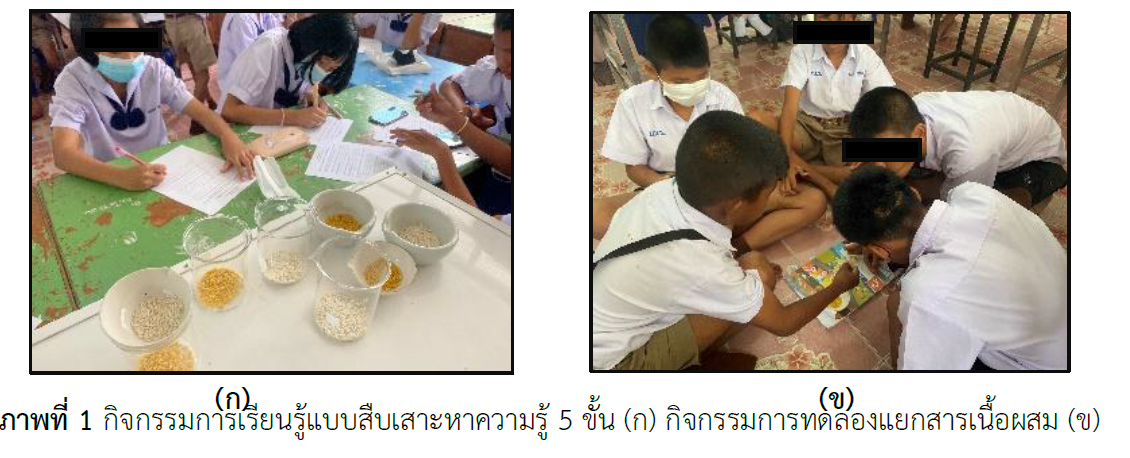ผลของการจัดกิจกรรมการเรียนรู้แบบสืบเสาะหาความรู้ 5 ขั้น เรื่องการแยกสารเนื้อผสม ที่มีต่อผลสัมฤทธิ์ทางการเรียนและความสามารถด้านการคิดวิเคราะห์ของนักเรียนชั้นประถมศึกษาปีที่ 6
Main Article Content
บทคัดย่อ
การวิจัยครั้งนี้มีวัตถุประสงค์ 1) เพื่อพัฒนากิจกรรมการจัดกิจกรรมการเรียนรู้แบบสืบเสาะหาความรู้ 5 ขั้น ของนักเรียนชั้นประถมศึกษาปีที่ 6 ให้มีประสิทธิภาพตามเกณฑ์ 85/85 2) เพื่อเปรียบเทียบผลสัมฤทธิ์ทางการเรียนหลังได้รับการจัดกิจกรรมการเรียนรู้แบบสืบเสาะหาความรู้ 5 ขั้น 3) เพื่อเปรียบเทียบความสามารถด้านการคิดวิเคราะห์ 4) เพื่อศึกษาความพึงพอใจของนักเรียนชั้นประถมศึกษาปีที่ 6 ที่มีต่อการจัดกิจกรรมการเรียนรู้แบบสืบเสาะหาความรู้ 5 ขั้น เรื่อง การแยกสารเนื้อผสม กลุ่มตัวอย่าง คือ นักเรียนชั้นประถมศึกษาปีที่ 6 โรงเรียนประถมศึกษาแห่งหนึ่งในจังหวัดมหาสารคาม ภาคเรียนที่ 1 ปีการศึกษา 2565 จำนวน 36 คน ซึ่งได้มาจากการสุ่มแบบกลุ่ม (Cluster random sampling) โดยใช้ห้องเรียนเป็นหน่วยของการสุ่ม จำนวน 1 ห้องเรียน การวิจัยนี้เป็นการวิจัยแบบการทดลองขั้นต้น โดยเป็นการทดลองแบบ One group pretest-posttest design เครื่องมือที่ใช้ในการวิจัย มีดังนี้ 1) แผนการจัดกิจกรรมการเรียนรู้แบบสืบเสาะหาความรู้ 5 ขั้น 2) แบบทดสอบวัดผลสัมฤทธิ์ทางการเรียน 3) แบบทดสอบวัดความสามารถด้านการคิดวิเคราะห์ และ 4) แบบประเมินความพึงพอใจ สถิติที่ใช้ในการวิเคราะห์ข้อมูล ได้แก่ ร้อยละ ค่าเฉลี่ย ส่วนเบี่ยงเบนมาตรฐาน และค่าสถิติ dependent t-test ผลการวิจัยพบว่า 1) แผนจัดการจัดกิจกรรมการเรียนรู้ มีประสิทธิภาพเท่ากับ 85.69/83.21 2) ผลสัมฤทธิ์ทางการเรียนของนักเรียนชั้นประถมศึกษาปีที่ 6 หลังการจัดการเรียนรู้แบบสืบเสาะหา 5 ขั้น สูงขึ้นอย่างมีนัยสำคัญทางสถิติที่ระดับ .05 3) ความสามารถในการคิดวิเคราะห์ของนักเรียนสูงกว่าก่อนเรียนอย่างมีนัยสำคัญทางสถิติที่ระดับ.05 4) ความพึงพอใจในการจัดกิจกรรมการเรียนรู้สืบเสาะหาความรู้ 5 ขั้น มีค่าเฉลี่ย เท่ากับ 4.80 อยู่ในระดับความพึงพอใจมากที่สุด
Article Details

อนุญาตภายใต้เงื่อนไข Creative Commons Attribution-NonCommercial-NoDerivatives 4.0 International License.
วารสารวิทยาศาสตร์และวิทยาศาสตร์ศึกษา (JSSE) เป็นผู้ถือลิสิทธิ์บทความทุกบทความที่เผยแพร่ใน JSSE นี้ ทั้งนี้ ผู้เขียนจะต้องส่งแบบโอนลิขสิทธิ์บทความฉบับที่มีรายมือชื่อของผู้เขียนหลักหรือผู้ที่ได้รับมอบอำนาจแทนผู้เขียนทุกนให้กับ JSSE ก่อนที่บทความจะมีการเผยแพร่ผ่านเว็บไซต์ของวารสาร
แบบโอนลิขสิทธิ์บทความ (Copyright Transfer Form)
ทางวารสาร JSSE ได้กำหนดให้มีการกรอกแบบโอนลิขสิทธิ์บทความให้ครบถ้วนและส่งมายังกองบรรณาธิการในข้อมูลเสริม (supplementary data) พร้อมกับนิพนธ์ต้นฉบับ (manuscript) ที่ส่งมาขอรับการตีพิมพ์ ทั้งนี้ ผู้เขียนหลัก (corresponding authors) หรือผู้รับมอบอำนาจ (ในฐานะตัวแทนของผู้เขียนทุกคน) สามารถดำเนินการโอนลิขสิทธิ์บทความแทนผู้เขียนทั้งหมดได้ ซึ่งสามารถอัพโหลดไฟล์บทความต้นฉบับ (Manuscript) และไฟล์แบบโอนลิขสิทธิ์บทความ (Copyright Transfer Form) ในเมนู “Upload Submission” ดังนี้
1. อัพโหลดไฟล์บทความต้นฉบับ (Manuscript) ในเมนูย่อย Article Component > Article Text
2. อัพโหลดไฟล์แบบโอนลิขสิทธิ์บทความ (Copyright Transfer Form) ในเมนูย่อย Article Component > Other
ดาวน์โหลด ไฟล์แบบโอนลิขสิทธิ์บทความ (Copyright Transfer Form)
เอกสารอ้างอิง
Anderson, L. W. and Krathwohl, D. R. (2001). A taxonomy for learning, teaching, and assessing: A revision of Bloom’s taxonomy of educational objectives. New York: Addison Wesley Longman.
Auppatham, R. and Poonpaiboonpipat, W. (2021). The case-based learning activities to enhance analytical thinking ability on ratio, proportion and percent for grade-7 students (in Thai). Journal of Science and Science Education, 4(1), 84-95.
Bloom, B., Englehart, M. Furst, E., Hill, W. and Krathwohl, D. (1956). Taxonomy of educational objectives: The classification of educational goals. Handbook I: Cognitive domain. New York and Toronto: Longmans, Green.
Bloom, Benjamin S. co-authors (1956). Taxonomy of Educational Objective Handbook I: Cognitive Domain. New York: David Mckay Company Inc.
Deshakupt, P. (2002). Learner-centered instruction, concepts, methods and techniques 1. Bangkok: The Master Group Management Co., Ltd.
Elder, L., and Paul, R. (2019). The thinker's guide to analytic thinking: How to take thinking apart and what to look for when you do. Rowman & Littlefield.
Khunkhang, S. (2022). Developing analytical thinking ability using inquiry-based learning for high vocationalcertificate 1 (in Thai). Journal of Research and Development Institute, Rajabhat Maha Sarakham University, 10 (1), 541 – 554.
Khunkhum, P and Sitti, S (2019). The Development of 5E Inquiry Learning Activities with Science Instructional Package to Enhance Analytical Thinking and Learning Achievement for Prathomsuksa 6 Students (in Thai). Journal of Education, Mahasarakham University, 13 (3), 143 – 155.
Kwinram, S., Noisombut, T., and Worapun, W. (2022). The Development of Science Learning Achievement and Analytical Thinking of Grade 7 Students Using 5E Inquiry-Based Learning Cooperated with Graphic Organizers. Journal of Educational Issues, 8(2), 433-444.
Laowreandee, W. (2006). Technical and tactical skills development of learner-centered learning management thinking skills. Bangkok: Faculty of Education, Silpakorn University, Sanam Chan Palace Campus.
Namtas, P., Pharanat, W. and Boontongtherng, P. (2019). The Development of Learning Achievement and Analytical Thinking on the Topic of Natural Resources for Prathom Suksa III Students using 5E Inquiry Learning with Multimedia (in Thai). The National Conference on Education for Learning Development 2019 (pp. 1282-1292). May 31, 2019. Bangkok: Suan Sunandha Rajabhat University.
Novak, J. D. and Gowin, D. B. Learning how to learn. New York: Cambridge University Press.
Olson, S and Loucks-Horsley, S. (2000). Inquiry and the National Science Education Standards. A Guide for teaching and learning. Washington, DC: The National Academies.
Panich, V. (2012). Learning development pathway of student in 21st century (in Thai). Bangkok: Sodsri Saritwong Foundation.
Perdana, R., Jumadi, J. and Rosana, D. (2019). Relationship between Analytical Thinking Skill and Scientific Argumentation Using PBL with Interactive CK 12 Simulation. International Journal on Social and Education Sciences, 1(1), 16-23.
Phonmueangdee, P. (2006). Comparison of academic achievement and permanence in Learn and satisfy
library subjects and research at the Certificate of Advanced Study level using regular teaching program
lessons. Master's thesis Banggkok: Srinakharinwirot Prasarnmit University.
Ratniyom, J., Jongpungklang, K., Sudsin, M., Chuchuoy, K., Tientongdee, S. and Lee, A. (2021). The effect of using Kahoot as a formative assessment tool in 4E×2 learning management on learning achievement and analytical thinking ability (in Thai). Journal of Science and Science Education, 4(2), 264 - 278.
Robbins, J. K. (2011). Problem solving, reasoning, and analytical thinking in a classroom environment. The Behavior Analyst Today, 12(1), 41 - 48.
Seekeaw, N. and Nasaree, N. (2022). Infused integrated learning management by using an inquiry method
entitled “cell transportation” for grade-7 students (in Thai). Journal of Science and Science
Education, 5(2), 322-331.
Srisaard, B. (2002). Preliminary research. (7th edition). Bangkok: Suviriyat Epistles.
Supamustduangkoon, P. (2016). The Development Of Learning Achievement And Analytical Thinking Ability On Natural Disasters Of Matthayomsuksa 5 Students By Inquiry Based Learning (5e) (in Thai). Veridian E-Journal, Silpakorn University, 9(1), 1349 - 1365
Theabthueng, P., Khamsong, J. and Worapun, W. (2022). The Development of Grade 8 Student Analytical
Thinking and Learning Achievement Using the Integrated Problem-Based Learning and Think-Pair-Share
Technique. Journal of Educational Issues, 8(1), 420-429.
The Institute for the Promotion of Teaching Science and Technology. (2006) Meeting Materials Outreach, amplification and training of the Inquiry Cycle (5E) learning process to develop a high-level cognitive process. Bangkok: Institute for the Promotion of Teaching Science and Technology.
The Institute for the Promotion of Teaching Science and Technology. (2008). Science textbooks. Bangkok: Kurusapa, Ladprao.
The Institute for the Promotion of Teaching Science and Technology. (2012). Measurement, evaluation, science. Bangkok: C.EdUnition.
Uttaman, A and Art-in, S (2012) The Development of Learning Achievement and Analytical Thinking for The Pratomsuksa V Students by Using 5E Inquiry Cycle (in Thai). Journal of Education Graduate Studies Research, 5(3), 162 - 168
Worakham, P. (2012). Educational research. Mahasarakham: Mahasarakham Rajabhat University.


